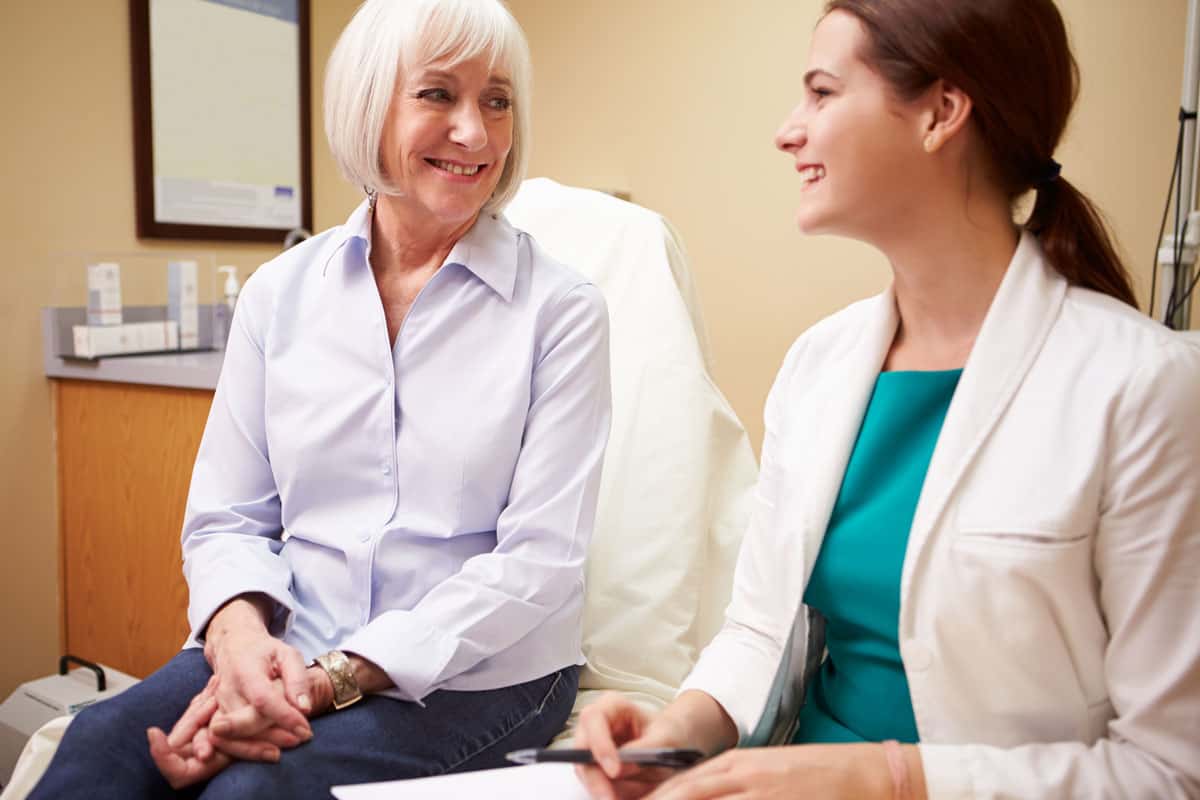Dr. Rebecca Schnatz, a board certified OB/GYN with Virginia Physicians for Women, shares her comprehensive, organized approach.

Approximately 80 to 90 percent of women will experience menopausal or postmenopausal symptoms, yet only 20 to 30 percent will actually seek treatment. Quite a lot of women are simply “grinning and bearing it,” often due to a lack of knowledge as to what is happening to their bodies. They know only that menstruation ceases, hot flashes and night sweats may occur, or that they may become moody.
By knowing what to discuss with your physician at each visit, you can make the most of your appointment time and get answers to help during this transition.
Dr. Rebecca Schnatz, a board certified OB/GYN with Virginia Physicians for Women, shares her comprehensive, organized approach for a woman’s self-evaluation prior to meeting with her physician and/or gynecologist.
An easy way to organize your thoughts is to take account of your body – from the top on down. Jot down any concerns prior to your visit to be sure you discuss everything with your physician.
Brain: Discuss any cognitive and emotional changes such as mental fogginess, anxiety, crying, irritability, depression, memory and cognition. Do you react differently than you used to? Do you suddenly feel overwhelmed, like a switch just turned on and you start crying? Do you feel something like a panic attack boiling over? Such feelings can be consistent with hormonal changes that occur during menopausal years and affect you mentally and emotionally. People are often surprised by these changes, especially when they happen gradually over time.
It’s important to keep in mind that there may be other contributing factors affecting women during this stage of life – children leaving home, caring for aging parents, changes with work or family, and other medical conditions that may arise.
Being in touch with both primary care and OB/GYN care is important during this time, as treatment may benefit from a collaborative effort. Individual health providers take the problem as it exists, no matter what the causes are, looking specifically for contributing factors in their area of expertise.
Thyroid: Usually this is more of a primary care issue, but I include it because so many women have thyroid issues and often it comes up during an annual GYN visit. Thyroid dysfunction can cause bleeding changes and worsen other perimenopausal symptoms such as fatigue, hair loss and weight gain.
Bones: Osteoporosis and low bone mass (aka osteopenia) are common as people age. Osteoporosis or decreasing bone density can lead to an increased risk of fracture if you fall which may lead to other complications as you age. Your physician may recommend calcium and vitamin D supplements as well as bone density screening for high-risk patients. For low-risk women, screenings generally begin at age 65, but those with family history or other risk factors should be screened earlier.
Breast health: Discuss with your doctor if you notice any skin changes, pain, nipple drainage, lumps, bumps or anything you’re concerned about. Yearly mammogram screenings are recommended, and breast self-exams should be performed at least monthly. It is also important to inform your physician of any family history of breast or ovarian cancers.
Bladder Health: Bladder dysfunction is a hot topic for many women as they age, including urine leakage or frequent urinary tract infections. Some issues can be alleviated with behavioral changes alone, while others may require medication or surgery.
Pelvic Organs: Are you having changes in your monthly bleeding cycles? Menopause is technically defined as no period for 12 months. During this time, many women may be frustrated by the irregularity and unpredictability of their bleeding patterns. Women may become pregnant during this time, so birth control is still important to discuss.
If you are post-menopausal, discuss bleeding of any type. Often it’s not cancer, but as a doctor, I’ve seen some minor spotting that led to testing and a cancer diagnosis, so I take it very seriously. It’s worthy of a conversation so I can ask more targeted questions. Sexual changes and problems such as painful intercourse should be part of our discussion as well.
During your exam, a Pap smear, the screening test for cervical cancer, is done for women who meet the current screening guidelines. But even if a Pap itself is not indicated, it is still important for a woman to have a thorough pelvic exam to check all the pelvic organs. Incidentally, women who have had a hysterectomy should continue with gynecological visits.
External Vulvar Health: Tell your physician if you have noticed skin changes, itching, ulcerated areas, lumps or bumps in your labia majora, perineum or anus. Skin changes, including cancer, can occur there at any time but especially after 40. A doctor can also note changes during an exam.
Hemorrhoids are also common and can be tricky to treat, but important to discuss with your physician if you are having problems here.
A physician can also help diagnose pelvic organ prolapse (bulging or dropping pelvic organs), which can occur after pregnancy, with weight gain, or with gravity and aging.
STDs: Women who are widowed or divorced may become more sexually active and should discuss their concerns honestly and have conversations about screenings, prevention and more.
Final thoughts: Many women spend more time caring for others than for themselves. If some of these topics have been weighing on you, even if they’re only minor inconveniences, consider your own value and talk with your doctor.
 Dr. Schnatz recently moved to Richmond with her husband and two children. Previously she practiced in Pittsburgh, PA, and Charleston, WV and is very excited to be joining VPFW this fall.
Dr. Schnatz recently moved to Richmond with her husband and two children. Previously she practiced in Pittsburgh, PA, and Charleston, WV and is very excited to be joining VPFW this fall.
She practices general Obstetrics & Gynecology and has an interest in preventive care, prenatal care, minimally invasive surgery, and menopause. She enjoys outdoor activities, the beach, food & wine, and spending time with family and friends.